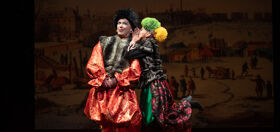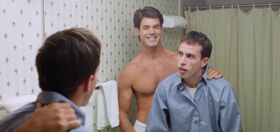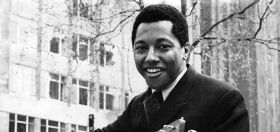![]() This article was written by Sam Wollaston, for The Guardian on Sunday 20th March 2011 21.04 UTC
This article was written by Sam Wollaston, for The Guardian on Sunday 20th March 2011 21.04 UTC
Two things were going on in Berlin in the early 1930s. First, it was the sex tourism capital of Europe, a paradise of hedonism particularly favoured by gay young English gentlemen of a literary persuasion. And second, Nazism was gathering momentum, inexorably. The two didn’t always sit comfortably together. Imagine it, one minute a handsome young man called Caspar is doing press-ups for you on the jetty, bulging rather splendidly in his tight trunks. And the next time you see him he’s in a flipping SS uniform! True, he does look simply marvellous in it, but it is all rather worrying.

Christopher and His Kind (BBC2, Saturday) follows a young Christopher Isherwood, played by Matt Smith, from the starchiness of his domineering mother and the greyness of 30s Britain to join his friend and sometime lover WH Auden in Berlin. Isherwood is there to decide who and what he is. And for the boys, which Kevin Elyot’s adaptation of Isherwood’s own memoir doesn’t shy away from – there’s an awful lot of Wie geht’s Deinen Vater going on in the cellar bars and clubs. Blimey.
I was worried about it to start with – the drama, not the sex (which I’m obviously totally fine with). On the train through Europe, Isherwood meets a seedy gentleman who turns out to be Gerald Hamilton. “Are you going all the way?” he asks Isherwood. “Excuse me!” says Christopher, taken aback. Are you going all the way? What is this – Carry On Up Gay Berlin?
How about we take this to the next level?
Our newsletter is like a refreshing cocktail (or mocktail) of LGBTQ+ entertainment and pop culture, served up with a side of eye-candy.
I needn’t have worried, that was an uncharacteristic lapse into saucy postcard innuendo. Christopher and His Kind is much better than that, a lot of which has to do with Smith’s mesmerising performance. As his Doctor Who predecessor David Tennant has done, Smith shows here that his range stretches way beyond time travel. Excellent as he is as the Doctor, that is a strangely asexual role. There’s nothing asexual about this one. But it’s more than pure smut; Smith is appealingly rakish, thoroughly disreputable, charming, posh, clever and funny – there’s something of John Hurt’s Quentin Crisp about him, a lovely portrayal.
Smith’s isn’t the only fine performance here. Toby Jones is a fabulously pervy Hamilton. The sardonic Pip Carter has the best lines (“I do loathe the sea, it’s so wet, and sloppy”), as he should do, being Auden. Lindsay Duncan is formidable as Isherwood’s mum. Young Perry Millward is great as his awkward, twitching younger brother (extraordinary hair he’s got – side-parted, high and solid, almost like a geographical feature). And Imogen Poots is simply marvellous darling as luvvie Jean Ross, the inspiration for Liza Minelli’s Sally Bowles character in Cabaret.
It’s a long time since I saw Cabaret, but I think I like this better; there isn’t all that infernal singing. Well, Poots does do a couple of songs – rather well – but it doesn’t intrude. I’m not good with musicals.
What Christopher and His Kind does do as well as Cabaret did in 1972 is to capture a place and a time – an extra-ordinary place at an extraordinary time of transition, between the dying embers of the bohemian Weimar Republic and the fascist fist of the Nazis. And set against that ominous backdrop is a tender, touching, personal story of self- discovery. Brilliant, top drama, well done.
Niall Ferguson also knits the small in with the big, the personal with the momentous, in his Civilization: is the West History? (Channel 4, Sunday). Through the stories of poor English settlers in North America, and conquistadors and then liberators in South America, he explains how it came about that the United States is now the dominant force in western civilisation. And it all comes down to what he describes as his “killer app” number three: property.
In the South, after the land was snatched from the indigenous people, it was owned by the king back in Spain, then by a few greedy noblemen such as this Jeronimo de Aliaga dude. Even liberation from Europe didn’t lead to democracy, and land is still the big issue in much of Latin America today. In North America, settlers such as Abraham Smith and Millicent Howard worked to earn the right to both land and suffrage, freedom through property. And that’s how the American Dream started, though it’s not a untarnished one because freedom was possible only if you were white.
Ferguson’s is a no-nonsense approach: here’s how it is, you better believe it. It’s not especially charming, but it certainly isn’t boring – it’s a a rollicking roller-coaster ride through time, so much fun it doesn’t even feel like school.
guardian.co.uk © Guardian News and Media Limited 2010


















Lefty
I saw it on Saturday and it was very good. It could have been a lot better in the drama department and I disagree that the scene it sets is impressive in any way – it’s more like a sketch of Berlin at the time than a convincing portrait, but the gay stuff was fan-fucking-tastic! It’s the boldest portrayal of gay sexuality I’ve seen on British TV since Queer As Folk.
I also thought Matt Smith’s portrayal of Isherwood was quite wooden and one-dimensional, tbh; but numerous scenes of him in the nud made up for that.
The Niall Ferguson thing written about underneath was also pretty good, incidentally. I can’t stand him usually, but I wouldn’t kick him out of bed.
Lefty
Incidentally, for anyone in the UK – as a follow-on to the Isherwood film, BBC2 are screening Cabaret tonight (Monday) at 11.20. Yay!!
tallskin2
Great stuff.
Although the Independent review was lukewarm about it.
http://www.independent.co.uk/arts-entertainment/tv/reviews/the-weekends-tv-christopher-and-his-kind-sat-bbc2-br-wonders-of-the-universe-sun-bbc2-2247603.html
And the Telegraph liked it.
http://www.telegraph.co.uk/culture/tvandradio/8391758/Christopher-and-His-Kind-BBC-Two-review.html
David Ehrenstein
Looks lovely.
kernelt
very promising, not to mention hot.
twilightofthedogs
It was good, but not great. I was impressed with the inclusion of actual gay sex. Also it made me look up the author’s history to make some links that I had not made until watching the movie. So, for that reason I have to thank the creators.
Charlie Jackpot
The one who played Caspar hasa gorgeous body – very very hot
Todd
What about us folks in the States? Any idea if/when it will make it across the pond?
Stevie
Beatiful! Full of passion and love and you can sense it.
ashton cruz
I have a link to the full movie free on line if any of you is interested. Its a safe link Enjoy:
http://www.videoweed.com/file/ce5mgr76taob2
Ian
Ooooh Doctor, won’t River be surprised!